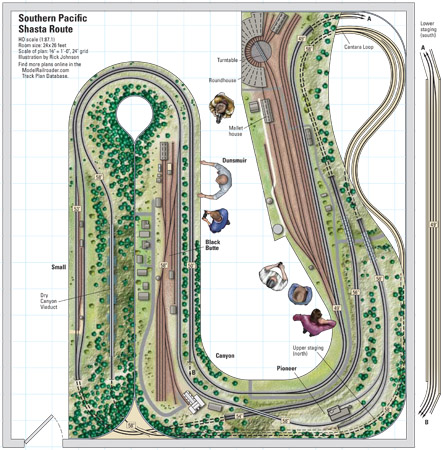
Name: Southern Pacific Shasta Route Scale: HO (1:87.1) Size: 24 x 26 feet Prototype: Southern Pacific Locale: Northern California Period: mid-1950s Style: walk-in Mainline run: 230 feet Minimum radius: 36″ Minimum turnout: no. 8 (main), no. 6 (yards) Maximum grade: 11⁄2 percent Benchwork: open grid and L-girder Height: 49″ to 58″ Roadbed: Homasote on T-girder […]
Read More…
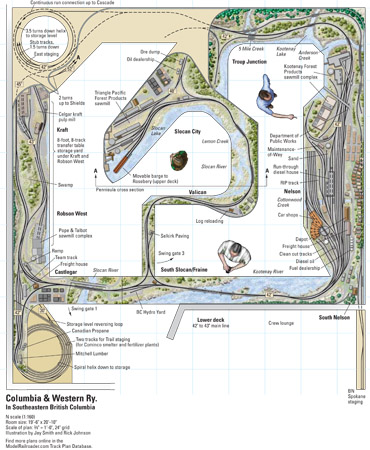
Name: Columbia & Western Scale: N (1:160) Size: 16′-6″ x 20′-0″ Prototype: Canadian Pacific Locale: southern British Columbia Period: 1970 Style: multi-deck walkaround with double-mushroom peninsula Mainline run: 230 feet Minimum radius: 18″ (main), 14″ (branch line) Minimum turnout: no. 5 Maximum grade: 2.5 percent Benchwork: open grid Height: 30″ to 76″ Roadbed: 3⁄4″ plywood […]
Read More…
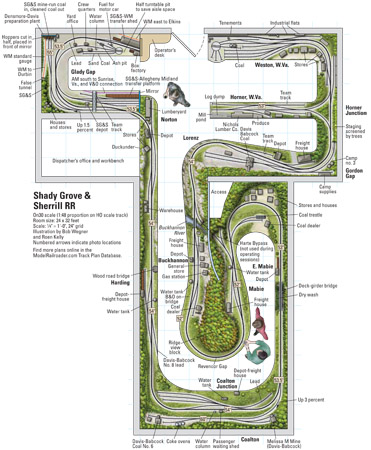
Name: Shady Grove & Sherrill Scale: On30 (1:48 proportion, scale 30″ track gauge) Size: 24 x 34 feet Theme: freelanced Locale: West Virginia Period: July 1947 Style: linear walkaround Mainline run: 200 feet Turnout minimum: no. 6 Maximum grade: 4 percent (main), 7 percent (branch line) Benchwork: open-grid and L girder Height: 52″ to 60″ Roadbed: […]
Read More…
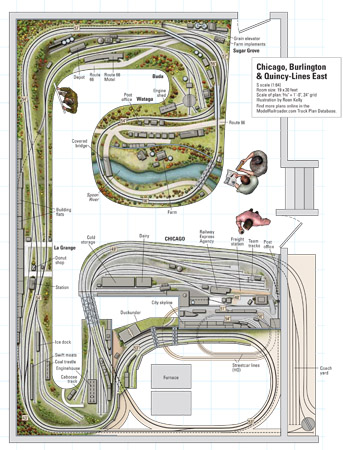
Name: Chicago, Burlington & Quincy-Lines East Scale: S (1:64) Size: 19 x 30 feet Prototype: semi-freelanced, inspired by CB&Q Locale: Illinois Era: late 1940s to early 1960s Style: walk-in Mainline run: 312 feet Minimum radius: 42″ Minimum turnout: no. 8 Maximum grade: 2 percent Benchwork: L-girder Height: 48″ to 56″ Roadbed: Homasote and cork Track: […]
Read More…
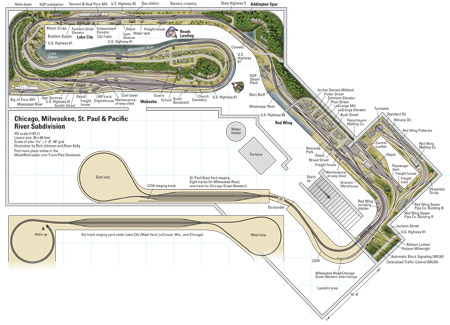
Name: Chicago, Milwaukee, St. Paul & Pacific River Subdivision Scale: HO (1:87.1) Size: 30 x 60 feet Locale: Eastern Minnesota along the Mississippi River Period: Early fall 1950 Style: walkaround Mainline run: 195 feet (per westbound and eastbound tracks) Minimum radius: 36″ Minimum turnout: no. 6 Maximum grade: 2 percent (in helix) Benchwork: L girder, […]
Read More…
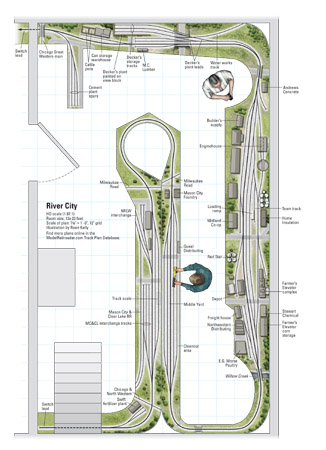
Name: River City Scale: HO (1:87.1) Size: 13 x 23 feet Prototype: Minneapolis & St. Louis Ry. Locale: Mason City, Iowa Period: first week of May 1954 Style: walkaround Mainline run: 90 feet Minimum radius: 18″ Minimum turnout: no. 5 Maximum grade: none Benchwork: open frame Height: 42″ Roadbed: Homasote on plywood Track: Peco code […]
Read More…
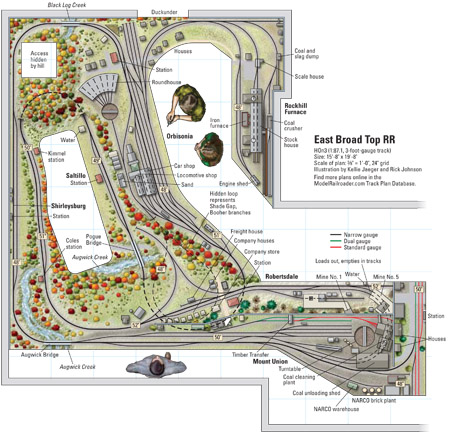
Name: East Broad Top RR Scale: HOn3 (1:87, 3-foot-gauge track) Size: 15′-8″ x 19′-8″ Prototype: East Broad Top RR Locale: south-central Pennsylvania Period: 1926 Style: walk-in Mainline run: 110 feet Minimum radius: 18″ Minimum turnout: no. 6 Maximum grade: 4 percent Benchwork: L-girder Height: 48″ to 52″ Roadbed: Homasote on plywood Track: Micro Engineering code […]
Read More…

Name: Nickel Plate Road, Kentucky Western Division and Canandaigua Southern RR, Southern Division Scale: O (1:48) Size: 18 x 89 feet Prototype: Nickel Plate Road and freelanced Locale: southern Ohio and western Pennsylvania Period: May 1958 Style: walk-in Mainline run: 1,000 feet Minimum radius: 64″ (main line), 56″ (staging loops) Maximum grade: 2.5 percent Benchwork: […]
Read More…
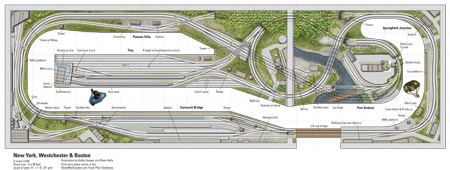
Name: New York, Westchester & Boston Scale: S (1:64) Size: 12 x 39 feet Prototype: alternate history New York, Westchester & Boston Locale: New England Period: 1955 Style: around-the-walls with peninsula Mainline run: 120 feet Minimum radius: 42″ (visible), 36″ (hidden) Minimum turnout: no. 6 Maximum grade: 2.5 percent (main), 3 percent (branch), 4 percent (down […]
Read More…
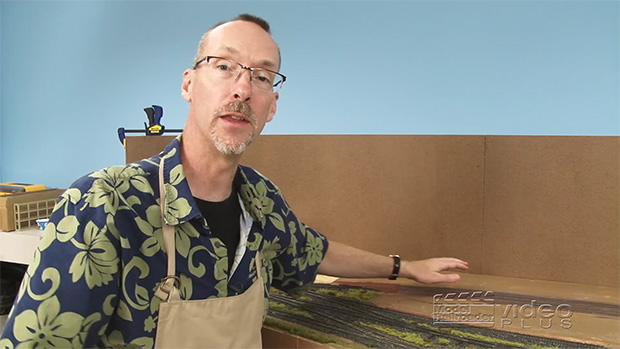
Having trouble viewing this video? Please visit our Video FAQ page In part 2 of MRVP’s Winston-Salem backdrop installation series, David Popp demonstrates the techniques used for patching the seams where two hardboard sections abut. He covers everything from preparing the working surface to sanding the joint compound smooth — all of the steps […]
Read More…
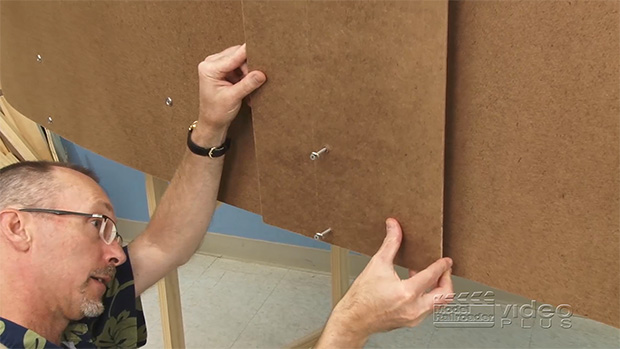
Having trouble viewing this video? Please visit our Video FAQ page MRVP’s David Popp launches into another informative multi-part series. This time he shows why and how to install, finish, paint, and even light a hardboard backdrop along the back of our Winston-Salem HO scale project layout. Part 1 covers the initial assembly process. […]
Read More…











